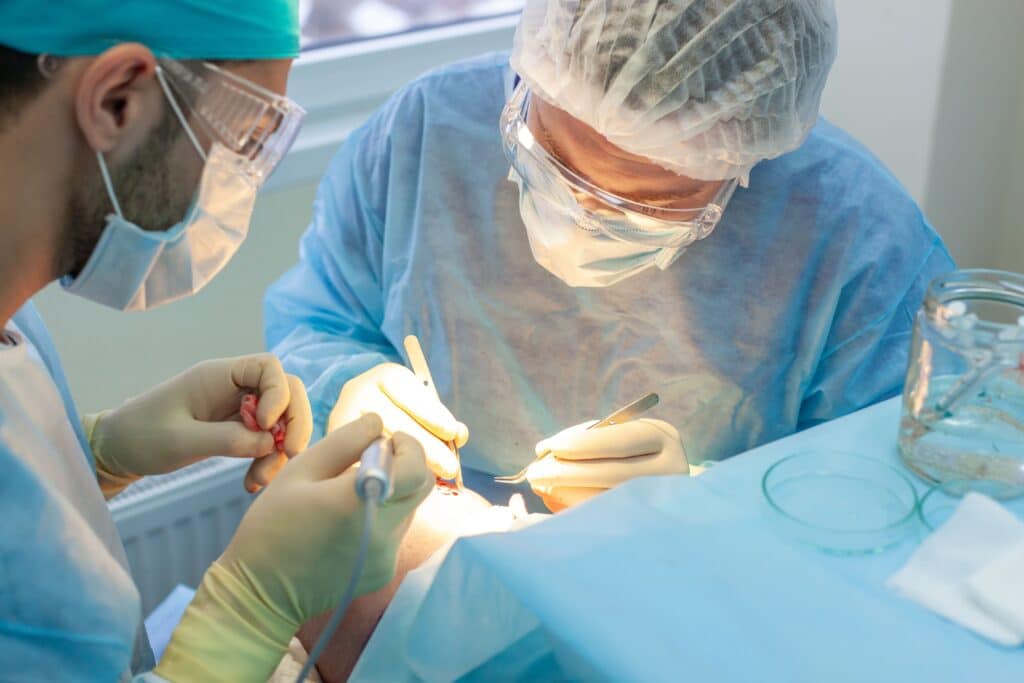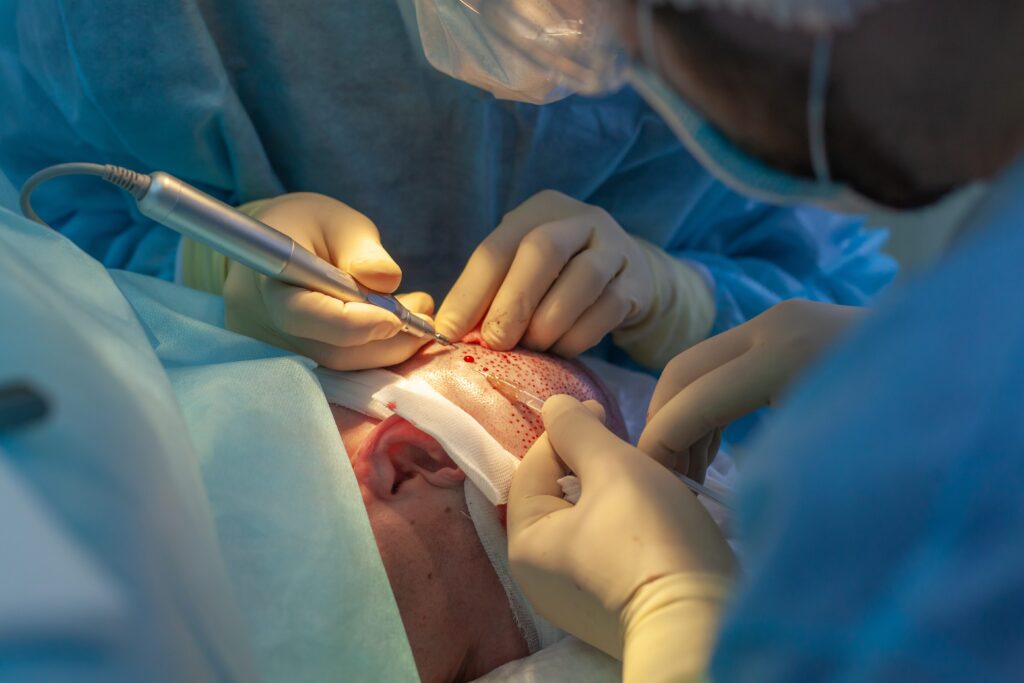Hair loss is a common concern for so many men and women. While there are various hair loss treatments available, hair transplant surgery remains a popular option for achieving a natural-looking head of hair.
However, despite its popularity and widespread effectiveness and popularity, there are some myths circulating online, including the concern that a hair transplant cause cancer.
So, can hair transplants cause cancer? This blog post will help address this concern and provide factual information about hair transplants and their potential side effects.
Do Hair Transplants Cause Cancer?

The short answer is no. There is no scientific evidence to suggest that FUT (Follicular Unit Transplantation) or FUE (Follicular Unit Extraction) hair transplants cause cancer. Hair transplant surgery involves moving healthy hair follicles from a donor area on the scalp, typically the back and sides, to a recipient area experiencing hair loss.
This minimally invasive procedure focuses solely on the top layer of the skin and hair follicles. Cancer development is a complex process involving genetic mutations within cells, and hair transplantation does not trigger such changes.
What Are The Side Effects Of Hair Transplant?
Hair transplant surgery is generally considered safe when it is performed by a qualified hair transplant surgeon. But, as with any surgical procedure, there may be a few side effects.
Infections. As with any surgery, there’s a slight risk of infection. This is because any break in the skin creates an opening for bacteria to enter.
To minimize this risk, your surgeon will likely prescribe antibiotics to take after the procedure. Additionally, following proper post-surgical care instructions provided by your surgeon is essential.
Swelling and bleeding: Minor swelling and bleeding around the recipient and donor areas are common after surgery. It’s essential to note that swelling usually diminishes within a few days.
Shedding. You might experience temporary shedding of the transplanted hair follicles shortly after the procedure. This is a normal part of the hair transplant process and shouldn’t be a cause for alarm.
The transplanted follicles go through a resting phase before entering the growth stage. This shedding typically occurs within 2 to 4 weeks after the transplant, and new hair growth becomes visible after 3 to 4 months.
Nerve damage. Temporary numbness or tingling in the scalp can occur due to anesthesia or minor nerve irritation during surgery. The anesthesia used during the procedure can temporarily numb the scalp, and this numbness might persist for a few days after the surgery.
Additionally, minor nerve endings in the scalp might be irritated during the extraction or implantation of hair follicles. In most cases, this nerve irritation resolves on its own within a few weeks or months as the scalp heals.
Folliculitis. This is an inflammation of hair follicles, appearing as small, red bumps around the transplanted area. It’s a relatively uncommon side effect, but it can occur if bacteria enter the follicles during the healing process. Folliculitis is usually easily treated with antibiotics or topical medications prescribed by your surgeon.
Dermal cyst. In rare cases, small cysts may develop around transplanted follicles. These cysts are typically harmless and appear as small, dome-shaped bumps under the skin. They can develop due to a buildup of keratin.
Dermal cysts are easily treatable if diagnosed early. They often disappear in a few weeks without any treatment.
Are There Any Long-Term Side Effects Of Hair Transplant?

Almost all of the side effects of a hair transplant procedure are temporary and will disappear in a few weeks. However, in rare cases, some people may experience long-term scarring or uneven hair growth. These problems are usually related to the skill of the hair transplant surgeon and the technique used. Remember that the surgery is comprehensive and needs proper care before and after the surgery to achieve natural-looking results.
What Are The Short-Term Side Effects Of Hair Transplant?
Most short-term side effects of hair transplants, as mentioned earlier, are mild and resolve within a few days or weeks. These can include swelling and bleeding, discomfort, pain shedding, minor infection, folliculitis, numbness, and dermal cysts. Remember, these side effects are usually mild and manageable. To make sure you have a smooth healing process, it is very important to follow your surgeon’s post-surgical instructions.
Can Cancer Patients Get A Hair Transplant?
Having skin cancer in the past doesn’t automatically rule out getting a hair transplant. However, the safety of hair transplants in patients with a history of cancer often depends on several factors. These factors include the type of skin cancer you had, the stage at which the cancer was diagnosed, as well as the treatments received.
Generally, if your cancer has been effectively treated with no signs of returning, a hair transplant might be a possibility. But it’s important to talk to both your cancer doctor and a qualified hair transplant surgeon. They can assess your individual case and decide if a hair transplant is the right choice for you.
What Precautions Should Patients With Cancer Take When Considering a Hair Transplant?

For those with a history of cancer considering a hair transplant, it’s important to take a few precautions to ensure the safest possible outcome.
Consult with your oncologist: Get a green light from your oncologist. They can assess your current health and determine if your body is strong enough for a hair transplant surgery, considering your medical history and past treatments.
An evaluation by a qualified hair transplant surgeon: A skilled surgeon will examine your scalp to ensure you have sufficient healthy donor hair follicles and assess any potential risks due to past surgeries or scarring from skin cancer treatment.
Regular follow-ups: Maintaining regular check-ups with both your oncologist and dermatologist is vital for monitoring your skin health and detecting any potential issues early.
Timing: Depending on your specific cancer treatment, there might be a waiting period before a hair transplant is considered safe. Discuss the ideal timeframe with your oncologist.
Why Choose Cosmedica for hair transplant surgery?
It’s important to choose a qualified hair transplant surgeon with a proven track record and experience using advanced techniques. Dr. Levent Acar at Cosmedica Clinic is a renowned hair transplant specialist who prioritizes patient safety and natural-looking results.
Ready to regrow your confidence? Visit our website to get expert advice and see real patient results before you decide. Cosmedica is the perfect choice for your hair transplant journey!
